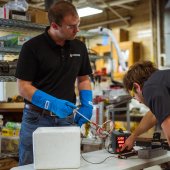Michigan Tech has a long-standing reputation of offering an unparalleled mechanical and aerospace engineering education.
Our challenging coursework, wide-ranging options, and state-of-the-art facilities will provide you with an experience like no other. As a graduate, you'll have hands-on abilities and the capacity to hit the ground running thanks to world class faculty and innovative teaching—each and every course is taught by faculty.
Tomorrow needs mechanical and aerospace engineers who are prepared to make a difference in the world to solve challenges in healthcare, energy, transportation, space exploration, climate change, and more. We're ready. Are you?
Bachelor's Degrees

Aerospace Engineering
A bachelor’s degree in aerospace engineering will take you to the stars. Design, construct, and test real spacecraft, aircraft, and related systems, crafting out-of-this-world solutions for challenges in propulsion systems, structural design, and system engineering. At Michigan Tech, you will gain hands-on experience that prepares you for cutting-edge industry.
Aerospace engineers use the foundational principles of structures, materials, gas dynamics, space science, and orbital mechanics to design and test real products and prototypes—like the three satellites already built by Michigan Tech engineering students. Focusing in areas like aerodynamic fluid flow, structural design, navigation and control, and propulsion and combustion, aerospace engineers also work in research and development and manufacturing. You’ll be well-suited for employment in a wide range of aerospace engineering fields, including astronautics, aeronautics, spacecraft and aircraft design, mechanics, structural design, communication, and astrodynamics.
Pathways are wide-ranging and include:
- Drafting blueprints and other technical drawings for aerospace products and equipment
- Manufacturing and repairing components for spacecraft and aircraft
- Designing, testing, and launching microsatellites to enhance communication between spacecraft and ground receivers
- Determining which materials and substances an aircraft requires to meet durability and safety requirements

Mechanical Engineering
Ranking in the top ten in degrees awarded for twenty-seven consecutive years, a bachelor's degree in mechanical engineering will prepare you to create a better tomorrow. Design components, devices, systems, and processes that will help solve today's biggest challenges in health care, transportation, world hunger, climate change, and more. At Michigan Tech, you will gain the skill set necessary for driving technological innovation.
Mechanical engineers apply the principles of motion, energy, force, and materials to design innovative products that are safe, efficient, reliable, and cost effective. In addition to design, as a mechanical engineer you'll work in research and development, testing, and manufacturing. You'll be well-suited for employment in a wide range of mechanical engineering fields, including the aerospace, automotive, biomedical, chemical, computer, communications, nanotechnology, and power-generation industries.
Pathways are far-reaching and include:
- Studying auto aerodynamics using powerful supercomputers
- Designing a rocket engine to withstand the subzero temperatures of outer space
- Developing a microprobe small enough to dissect a single nerve cell under a microscope
- Analyzing machinery such as gas turbines, control devices, and jet engines, with the goal of improving performance
Career Options are Tremendous
- Analyzing machinery such as gas turbines, control devices, and jet engines, with the goal of improving performance
- Designing a rocket engine to withstand the subzero temperatures of outer space
- Studying auto aerodynamics using powerful supercomputers
- Developing a microprobe small enough to dissect a single nerve cell under a microscope



